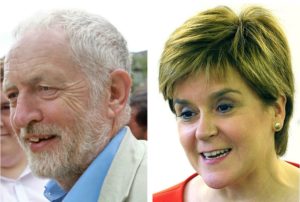Analysis: Brexit not a done deal
 Like the tumblers on a poker machine the forces for and against Britain’s exit from the EU are realigning over and over again.
Like the tumblers on a poker machine the forces for and against Britain’s exit from the EU are realigning over and over again.
And the truth is beginning to dawn on some of Britain’s most hardened ‘Brexiteers’ whether it is a hard or soft landing, if Brexit goes ahead the result will be bad for Britain.
Even Nigel Farage, the former chief anti-Europe megaphone, has welcomed calls for a second referendum.
Publicly, he says the ‘leave’ side would easily win, putting the issue to bed for a generation.
But observers of the former head of the right wing UKIP Party say he is concerned that without his own bluster, people will stop believing the lies they were told about how good it was all going to be.
Brexit was born out of xenophobia and fears of rising migration to the UK. But how it will play out from here may come down to simple economics.
Two key players crucial in how the Brexit imbroglio will end are Scottish First Minister Nicola Sturgeon and Labour leader Jeremy Corbyn.
Sturgeon talks some sense on the economics of Brexit. She has stuck to the principle that Britain should stay in the single market and that Britain and Scotland would benefit from more immigration.
It really doesn’t take an economics expert to work that out.
And she has called on Corbyn to change his “inexplicable” stance on the EU and support Britain staying in the single market.
Sturgeon recently told the BBC “There would be a Commons majority for staying in the single market if Labour gets its act together”.
“Jeremy Corbyn has to decide where he stands, most of his supporters will be disappointed that he is only in favour of slightly less hard Brexit than the Tories are.”
Corbyn’s dogmatic opposition to the EU is predicted on his fear that state aid rules of the single market would prevent him propping up ailing UK industries – and that is also at the root of his reluctance to endorse a ‘remain’ campaign.
However, he is coming under pressure from his own party to soften his view as the catastrophic effect of a trade wall with the EU becomes apparent.
Brexit can be stopped but it will need the combined forces of Corbyn and Sturgeon to do it.
So far in negotiations, the EU has asked the UK to agree to £50billion divorce costs and assurances for EU citizens and the EU Supreme Court. They got it. They wanted an undertaking that there would be no hard border in Ireland. They got it.
A pattern has emerged of the EU making reasonable demands and the UK negotiators, after some grandstanding for domestic political purposes, giving in.
This is likely to happen in trade talks too. It is what happened when the UK first joined in the 1970s and it will happen again.
But there is increasing evidence that even the softest Brexit possible will damage the UK economy.
The pressure is rising on Corbyn to differentiate Labour’s Brexit stance from the Conservative Party’s.
The consequences of a deal that left Britain worse off and seriously hurt working people, would damage the standing of British politics for generations.
Laurie Nowell
AMES Australia Senior Journalist












